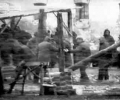Serbian Supreme Court Obstructs War Crimes Trials
The Serbian Supreme Court verdict in The Scorpions case showed once more that the Serbian Supreme Court, deciding in the second instance in war crimes trials, was guided by political and not legal considerations. Namely, in the first instance verdict rendered by the Belgrade District Court War Crimes Chamber on 10 April 2007, defendants Slobodan Medić, Pero Petrašević, and Branislav Medić were found guilty of a war crime against the civilian population, Aleksandar Medić was found guilty of abetting the same crime, while Aleksandar Vukov was acquitted of all charges. Slobodan Medić and Branislav Medić were sentenced to 20 years imprisonment, Pero Petrašević to 13, and Aleksandar Medić to five years of imprisonment.
This verdict ruled in one of the most grievous crimes committed during the armed conflict in the former Yugoslavia. On an undetermined day during the month of July 1995, at a place known as Godinske bare, in the vicinity of the town of Trnovo (BiH), six civilians, Muslims from Srebrenica, three of whom were minors, were executed.
The main and unique characteristic of this trial was the quality and a variety of evidence based on which the criminal responsibility of the defendants was completely, entirely, and without any doubt determined. There has been no single case in the recent past that was recorded on a VHS tape in detail and which was supported by material evidence, witness statements, court expert’s findings, and confessions of the defendants.
However, despite the evidence that had not been seen in the court practice before, the first instance court acquitted one defendant [Aleksandar Vukov], inaccurately qualified the criminal act another defendant was charged with [Aleksandar Medić], and rendered a lenient sentence to another defendant [Pera Petrašević].
The Serbian Supreme Court went even further in ignoring the facts, legislation, and law in the broadest sense and acquitted Aleksandar Vukov, dismissed the conviction of Aleksandar Medić, who as an accomplice was sentenced to a lenient sentence, Pero Petrašević’s lenient sentence was confirmed, and Branislav Medić’s sentence was reduced by five years.
A part of the Serbian Supreme Court’s verdict, which confirms the conviction of the principle defendant Slobodan Medić is the only part of this verdict based on evidence and the law. All other parts of the verdict are illegal, arbitrary, and based on the highly superficial assessments and inaccurate presentation of facts from the case file.
Assessing that there are only clues and no evidence of Aleksandar Vukov’s criminal responsibility, the Supreme Court confirmed the first instance verdict. The court completely ignored the fact that Aleksandar Vukov brought two of his men to the execution site and that they took part in the execution. Without Vukov’s order, they would not be able to stay at the scene, let alone participate in the execution. The case file also contains direct proof that Aleksandar Vukov designated the execution site because defendant Pero Petrašević said in his defence that Vukov had told him: “…that it was too risky to go further because of the heavy shooting…” This piece of evidence proves that Vukov designated the execution site because if Vukov was telling the truth that he had gone to get some rations, he would not have to warn Petrašević not to go any further since in this version of the story he was supposed to go back with the rations. The case file facts point out that rations had not been brought; that Vukov had never gone to collect rations for the men before, or that Petrašević had ever brought rations to the front before. Finally, the fact that Vukov saw prisoners who were tied and lying on the side of the road is certain. In such a situation, the Supreme Court could not have confirmed the acquittal, but should have dismissed the verdict and returned the case for retrial.
When approving Aleksandar Medić’s Defence Council’s appeal, the Supreme Court completely ignored the fact that Aleksandar Medić was an active and completely equal member of the group, which committed this execution. The group was homogenous, compact, and united in every way. They were the Commander’s bodyguards, who slept in the same house with him in the field, who followed him wherever he went. There is no possibility that some of the bodyguards knew the Commander’s order, and others did not. The atmosphere among the executors before, during, and after the execution, which was filmed on tape, shows that they were competing with each other as to who could abuse the prisoners more, kick them with boots, swear at them, offend and humiliate them. And all of them were not only arrogant, but also cheerful and euphoric. They forced the prisoners to go faster shouting “yala, yala” at them, which is the way cattle are herded, swearing at them, refusing them water, and humiliating them in different ways. Aleksandar Medić did not show in any way, in any word, by any action, that he was any different from the others. On the contrary, he asked one of the prisoners, a sixteen year-old boy, “Have you ever got laid” and when the boy said no he told him, “Well, and you won’t.” That is certainly enough to draw the conclusion that Aleksandar Medić knew that the prisoners were about to be executed. Even though Medić was beyond any doubt a co-perpetrator, the act he was charged with was qualified as abetting and the Supreme Court partially dismissed the verdict in the part relating to him and demands that it be determined whether that was a crime at all [it did not accept that it was abetting even though it is clear that he was a co-perpetrator]. It is a nonsense and it represents a cynicism that insults the closest family members of the killed and the memory of the victims.
Defendant Branislav Medić’s sentence was reduced from the original 20 to 15 years of imprisonment without any justification. Even though he was just a driver and no one ordered him to shoot, he shot and killed at least two civilians of his own volition, which points to his urge to kill. The Supreme Court’s view that he could not be sentenced to the same jail term as the principle defendant who ordered the execution is a legal nonsense and absurd.
Human rights organizations and the victims’ family members expected the Serbian Supreme Court to remove the faults of the first instance verdict and show that facts and application of law are holy to it. But we have had an opportunity to see that the Supreme Court seriously obstructs war crimes trials in Serbia and prevents justice from being served to defendants and victims.







